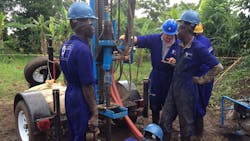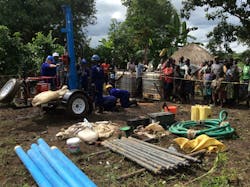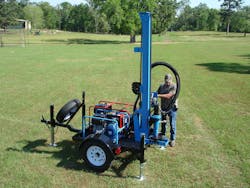As the sun rises over the rural Ugandan valley, a group of 12-year-old girls are getting ready for the day ahead. While 12-year-olds in other countries are thinking about the latest fashion trends, sleepovers with friends, or after-school activities, these girls must sacrifice their schooling to carry water.
Instead of reaching for a backpack for school in the morning, each girl takes a 5-gallon jerrycan that will hold the water her family needs for the day. The girls walk a few miles to get to the nearest water outlet — a 30-minute journey one way — and wait in line to fill their jerrycans. Once filled, they carry the 5-gallon jugs, each weighing around 40 pounds, by hand: the terrain is too rough for wheelbarrows and other tools that might lighten the load.
Time for a Change
On the other side of the world in Los Angeles, Calif., John Foley was working as a general contractor at the construction company he started in the early 1990s. Frustrated with constantly dealing in paperwork, he felt like keeping up the paper trail had become his job instead of the construction work he wanted to do.
He knew it was time for a change, but never imagined he’d be trading the streets of L.A. for a rural country in Africa to change the lives of Ugandan girls and their families.
“Back in the early 2000s, I started looking for new opportunities and the need for water kept coming up,” Foley says. “In 2015, I visited Africa for the first time and noticed people would walk for miles just to get enough water for the day. The need for water was unbelievable and I knew I could do something to help.”
As one of the most densely populated countries in Africa, and with 48 percent of the population under the age of 14, Uganda has a tremendous need for clean water: it’s critical to the health of their people and is key to addressing the poverty issues afflicting the region.
“Most people in Uganda are farming or working in the agricultural sector for a living and, according to USAID, only 32 percent have access to a basic water supply,” Foley says. “Without access to clean water, Ugandans are sacrificing hours of their day that could be put toward farming.”
In 2018, Foley left his business as a general contractor and started the 501(c)3 private operating foundation, JF Well Works Africa. To add further economic benefit to the area, he hired local individuals in Uganda and his team now totals seven. With the help of Foley’s wife, Victoria, they have been able to run the organization out of their house to this day.
The Drill that Started it All
Before Foley could start drilling water wells in Uganda, he needed to find the right drill for the job. Through a simple online search, he came across the LST1 water well drill from Lone Star Drills.
He decided to give it a try because of its affordable price and ability to transport with a four-wheel drive pickup.
“The LST1 water well drill helped us get started back in 2018 and has become an indispensable tool with its dependability,” Foley says. “It drilled 220 wells perfectly and has been very simple and easy to work on as we’ve done maintenance and updates.”
Mounted on a rugged yet lightweight single-axle trailer, the Lone Star LST1 drill can easily be pulled behind a UTV or small pickup truck, making it ideal for remote locations and rough terrain. Additionally, the heavy-duty 6- by 3-foot mast can be quickly and easily folded down for further convenience and safe transport. The LST1 features a drilling depth of up to 300 feet, and the combination of a powerful engine and mud pump ensure the unit operates at optimum speed and efficiency.
Foley and his team now use the LST1 water well drill for drilling shallow wells and have been impressed by how much of an asset it has been for their productivity.
“We typically work on 10 to 15 water wells at a time,” Foley says. “The LST1 has a robust hydraulic system that generates up to 5,000 pounds of force, which allows us to be as efficient as possible. Since we’re mostly working with clay and gravelly soil until we hit bedrock at 55 to 60 feet, having such a powerful portable drill allows the team to efficiently drill a new water well in just 4-6 hours without experiencing fatigue.”
Building a Foundation
Since starting JF Well Works Africa, Foley travels from Los Angeles to Uganda about four times per year and stays in Africa anywhere from three weeks to two months at a time.
“When it comes to deciding where the water wells should go, we pick the areas with the highest need,” Foley says. “We work with local government officials and subcounty officials and go through about 20 different steps to determine which communities need water wells the most. We never have to worry about moving around with our drill because the LST1 is so easy to transport from one location to the next.”
Once the communities are identified, the training begins. Foley and his team train 10-15 communities at a time to cover as much ground as possible. The process they’ve implemented is to have the locals from each community form a committee of 12 people, at least six of them women, and cover the essentials such as opening a bank account, finding someone to donate land, and coming up with certain agreements on how to maintain the well once it’s put in.
After the land has been acquired and agreements on well maintenance have been made, Foley and his team perform a hydro-geological survey to make sure there is water, and then get drilling.
Making a Difference
Since his start in 2018, Foley and his team have drilled more than 265 new water wells and repaired more than 100 existing wells. With an average of just over 600 people impacted per new well, that’s over 222,000 people whose lives have been changed with the simple addition of having clean water nearby.
Looking to the Future
After three years and 220 wells drilled with the same LST1, Foley decided to refurbish the drill to keep it in mint condition for optimal performance on future projects.
“Lone Star Drills has been a great help for us as we work to keep our LST1 drill in top shape,” Foley says. “I asked them to put together a list of anything that would wear out like chains, sprockets, and grease nipples. They got back to me right away and we were able to do the maintenance ourselves because the drill was so easy to work on.”
Foley also wants to take JF Well Works Africa to the next level by opening a training facility where he can teach people how to drill wells. The goal, he says, is to reach those who are already doing the work with other non-profit organizations and to find a standard way of doing things to increase productivity.
“The thing about drilling water wells is it’s not labor intensive, so you don’t need massive crews of people to do it,” Foley says. “The drill does all the work, which gives us the opportunity to refine the process and find the most effective methods to increase our efficiency.” WW
Published in WaterWorld magazine, August 2022.



